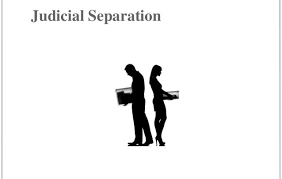Latest News
Judicial Separation in India

Judicial Separation in India
A happy marital life could also be a sheer result of unconditional love, faith, belief, passion, and determination between couples who ensure to stay together in every phase of life. But things end up ugly when both the spouses experience a lack of interest, mistrust, misunderstandings, differences, etc… amongst each other. Unfortunately, this results in the couple filing for Divorce. But the eyes of the law believe giving a chance to couples within the sort of legal separation.
What is meant by Judicial Separation in India
Judicial Separation may be a provision under the Indian marriage laws, wherein both the husband and therefore the wife get an opportunity to introspect about giving a chance to their marriage, before going on with the divorce proceedings. Under a decree of legal separation, both parties live separately for a period of your time getting adequate space, independence, and time to believe in continuing their marriage or not. During this phase, both the parties still carry an equivalent status of being husband and wife and yet at an equivalent time live separately also.
Grounds for Judicial Separation in India
The following grounds on which legal separation are often granted:
• Cruelty – Either of the spouse or both are cruel for each other.
• Desertion – Either of the spouses is not alive and is missing for seven years and above.
• Adultery – Either of the spouses is being cheated upon by other spouses. In case a husband or a wife knows that their respective spouse is married which the opposite person is alive during this petition; then the grounds for judicial separation strengthens.
• Forced conversion of faith – Either of the spouses is forcing the opposite one to vary and convert his/her religion.
• Incurable diseases such as leprosy, cancer, Ebola, etc…
• Insanity or abnormality – Either of the spouses is not in a sound condition.
• Venereal or sexual diseases – Either of the spouses is affected by sexual diseases like HIV, AIDS, herpes genitalis, Syphilis, etc…
• Rape, Sexual Harassment, Molestation, Bestiality, and Sodomy.
• Renunciation of the planet by either of the spouse on religious or spiritual grounds.
• Child marriage – Either of the spouses is married without his/her consent before attaining 18 years of age.
Difference between Judicial Separation and Divorce
Although the procedure of dealing defended and undefended proceedings for both legal separation and divorce are similar, yet there are certain differences between them. Explore them as follows:
• legal separation doesn't terminate marriage whereas in divorce the parties are not any more husband and wife and hence the wedding ends.
• While undertaking proceedings for legal separation, the court doesn't need to consider that the wedding is permanently closed or weakened whereas in divorce it's required while presenting the petition.
• Both the parties can file for legal separation any time post marriage whereas just in case of divorce the parties can only file for divorce only after completion of 1 year of marriage.
• A legal separation goes through one stage judgment procedure however; divorce goes through a two-stage judgment process.
• There are certain provisions in the Matrimonial Causes Act 1973 that are applicable to divorce but aren't applied to legal separation petitions regardless of browsing a two or five year separation period.
• Judgments with reference to Wills aren't applicable just in case of legal separation. In case the parties are undergoing a separation time and if one among the spouse dies then the prevailing spouse won't be benefited out of it and thus the property will devolve.
Hence, a legal separation could also be a process wherein, the Court provides a final address a couple of seeking a divorce, to undertake to resolve their differences by living separately, before the initiation of divorce proceedings. This gives time for introspection and resolving the matrimonial disputes and misunderstanding between the couple.



































































































